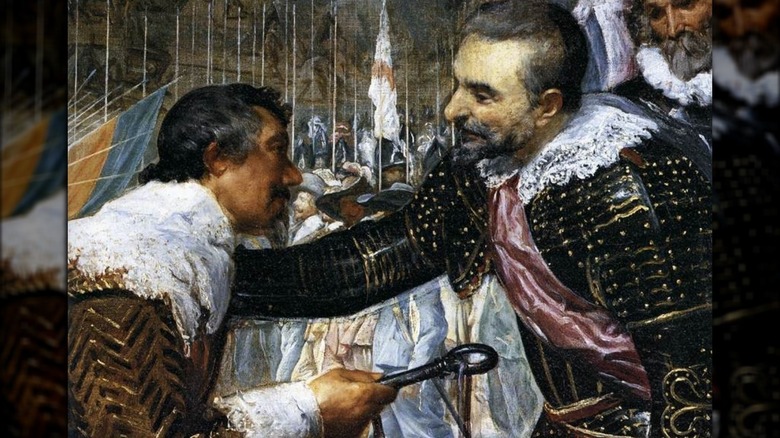What Does A Key To The City Actually Open?
Cities used to have walls, which means they also had gates. If you live in Ville de Québec, Bologna, Fez, or some other city whose gates are still standing, this won't surprise you. But did you ever think that those gates into the city had keys once to open them?
It's not clear how many cities could be literally locked or unlocked with a physical key in the Middle Ages. History of Keys notes that basic padlocks were available all over medieval Europe and Asia, so some gates, like the gate that led into the Ghetto of Venice (per Europe for Visitors), may well have had a physical key. But by the time Velazquez painted his "Surrender at Breda" (1635, above), the key to the city had become symbolic. In the painting, the Dutch city of Breda is handed over to Spanish forces in a ritualized handing over of a key. The Spanish now have the right to come and go as they please, as if the whole city were a house, and they now had the house keys.
A municipal honor
Per Brown University, early modern cities began awarding ceremonial keys to non-citizens as a special honor. In theory, if you had a city's key you could come and go as you pleased, even by night, when the city's gate was customarily locked. The point was to show that you'd earned the city's trust and affection. This is sometimes called the "freedom of the city."
Modern, gate-less cities still offer ceremonial keys. When Michael Bloomberg was mayor of New York City, he gave out at least 30 keys, including one to the Dalai Lama. Other recipients have been somewhat more controversial — just ask the haters of Alex Rodriguez, an athlete who also got a key to New York from Mayor Bloomberg.
The freedom of the city is a rather poor indicator of one's moral worth. In the photo above, the polarizing president of Brazil, Jair Bolsonaro, brandishes the key to the town of Pariquera-Acu, which he received at the opening of a bridge there. And in 1980, as Mental Floss notes, the city of Detroit granted a key to Saddam Hussein, in thanks for endowing a church.

